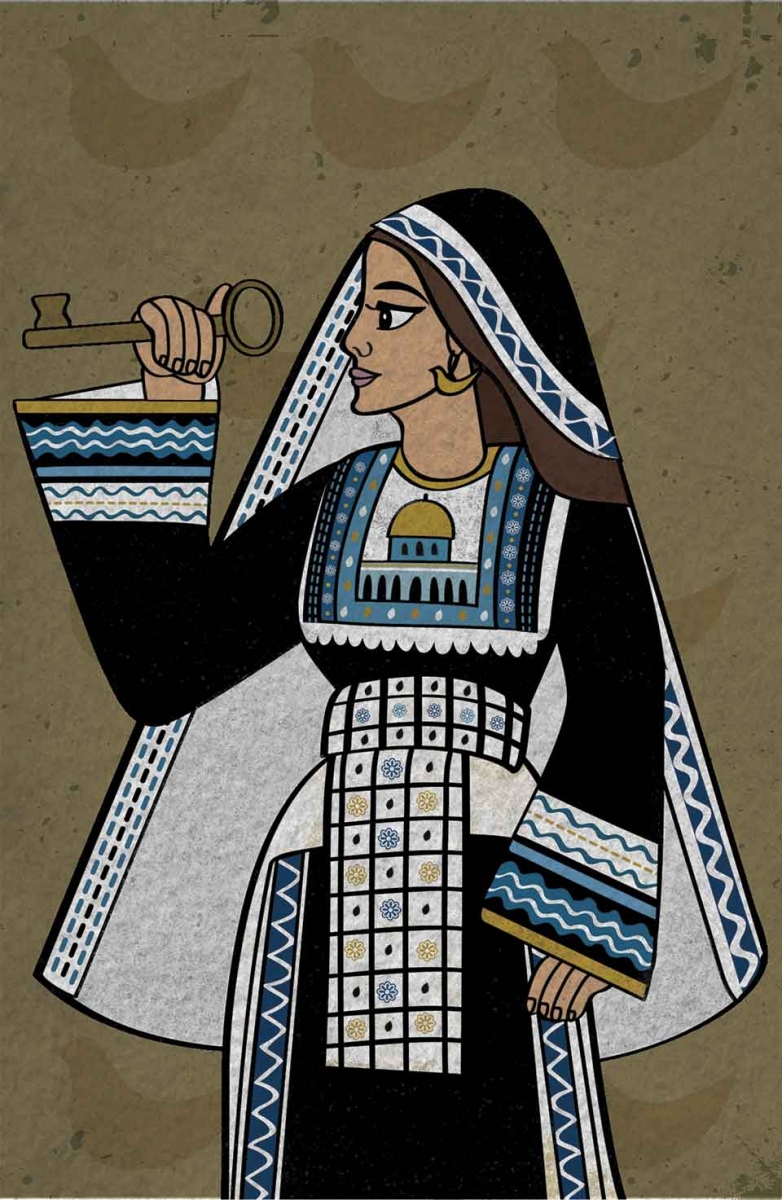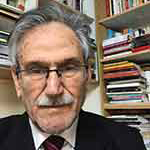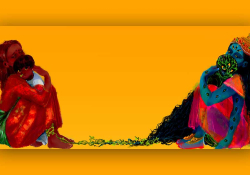The Little King

In the following parable, a young boy discovers that he is a king.
1
I never thought I’d become a king at the age of thirteen.
It was a coincidence. One day I saw two boys fighting. I intervened, and in my thirteen-year-old wisdom, I advised them to resolve any dispute by talking it through. At that moment, a young woman was crossing the street. She heard me, and as she passed me by, she said: “You are a king!”
Joy filled my heart. I didn’t expect such a high compliment. I was imitating my father’s behavior when I intervened. Whenever my sister Jumana and I fought, he used to separate us and say, “Listen, Jawad! Listen, Jumana! There is no point to this. When you disagree on something, talk it out. It’s the best way to end a dispute.”
It didn’t occur to me that the woman would consider me a king. I said to her: “Thank you, madam.” My eyes followed her till she disappeared, and then I went on my way to school.
2
I felt different after hearing the young woman’s words. I was joyous and thought that I was really a king. I almost told my schoolmates, but I decided to wait and thought: I’ll keep this a secret for a while.
Moments later, I realized I made the right decision. Just declaring myself a king would confuse my principal, teachers, and students. Every morning, the principal would have to leave his office to greet me at the entrance. It wouldn’t be appropriate for him not to perform the daily reception and farewell ceremonies for a king attending his school.
If the king’s visits were limited to one or two per year, the principal would’ve tolerated it. He’d perform his duty to the best of his ability, as would others, teachers and students alike. But to do that every day is too much. Therefore, I decided to keep it a secret and continue attending school as usual.
3
I don’t deny that my behavior changed.
I think it’s my right; it’s inconceivable to be a king and behave like a commoner. Those changes occurred despite my cautiousness to not reveal my secret. For example, I felt that I held significant responsibilities that couldn’t be shouldered by Jumana or my cousin Hatem, nor by Jeryes and his twin sisters, Mary and Lamees.
I think it’s my right; it’s inconceivable to be a king and behave like a commoner.
In the evening, my sister and I would walk to the square near our house. We would meet our friends, talk about our day, and play games. Everyone seemed happy and playful. I would also feel joyful yet responsible for the people, neighborhood, and city. I can’t bear seeing trash on the street, so I’d quickly collect it and throw it in a bin. I can’t stand seeing kids fighting; I’d rush to end it.
4
At home, my behavior changed, and my interest in those around me grew.
I became interested in listening to my father’s guests’ discussions of public affairs. I considered it a right since it’s inconceivable to be a king and not care about public affairs. Perhaps their interest in such matters is good fortune. My mother is interested too. She receives our guests with my father and holds various conversations useful to a king who’s no older than thirteen.
Sometimes, during a heated discussion, I’d think of causing a surprise. I’d get up, sit at the front, and declare before everyone that I am a king. I’d lead the discussion while everyone listens attentively. But at the very last moment, I refrain. I don’t want to burden my father; if he discovered that a king lives in his house, our lifestyle would completely change. My father would have to buy me a royal bed to sleep in; it’s unreasonable to continue sleeping in my old one. He’d also have to buy us a palace to live in. And servants, escorts, guards, and cars. Cats and dogs must be provided, too.
I abandon my idea and leave with Jumana to prepare coffee and tea. We don’t hesitate to serve the guests; Jumana does it with goodwill, and I do the same with no complaint or grumble. We serve our guests, but at the same time, I make sure to listen to their conversations. I hear them talk about the need for peace in our region to live in safety and security, so I grow more interested in that. I sit with Jumana and listen to our father asserting the importance of peace for us, our region, and the world.
5
Weeks after I saw the young woman, I grew suspicious and believed my secret was exposed.
Doubts arose when Jumana entered my room and said, “Good morning, Your Majesty!”
“Good morning,” I replied, “but why ‘Your Majesty’?!”
“What’s wrong with that? You deserve to be ‘Your Majesty!’ Aren’t you satisfied with that?”
“I am, of course, but what made you say such words?”
“I wasn’t thinking of anything specific. Maybe yesterday’s TV show was the reason.”
“Are you sure? Was it the show?”
It seemed that Jumana was surprised by my persistence in asking questions following her surprising jest. She asked: “Are you upset about what I told you?”
“No, I’m not, but I like to know the reason behind something.”
“You can call me ‘Your Majesty,’” she said. “I won’t be bothered or angry.”
I replied, trying to close the topic, “You deserve to be ‘Her Majesty.’”
6
She left me suspicious. She’s fourteen, and I love and respect her. My parents raised us in friendship and equality. They didn’t discriminate based on our gender. My father says: “We’re human beings with equal rights and duties, or this is how it should be.”
Therefore, we grew up bound by love and friendship, and it seems that she somehow knew that I was a king. I’m pleased that my sister knows, of course. It would please me to learn that all people know that, too. But I worry about family and friends and people; I don’t want to overburden anyone. I wouldn’t like it if they got preoccupied with me or always felt concern. It’s inconceivable not to think about every single detail of your behavior, no matter how small or large, if your neighbor’s a king. To not disturb me, you may have to walk on your toes. I don’t want that. I don’t want my family, friends, and people to live their lives in constant worry. I want them to live without any awkwardness and without having to take extra measures to serve the king.
7
I quickly left my house and went to visit the twins, Mary and Lamees. I’d find out the truth from them. They’re also thirteen and cannot hide anything from me.
I found them studying for their geography exam. “I won’t take much of your time,” I said, “but allow me to ask you a few questions.”
“Ask whatever you want,” Mary said.
“Yes, ask us whatever,” Lamees added.
“Have you heard of a king in this city?”
Mary laughed. “Did you come here to tell us a joke?”
“I’m not kidding,” I said, sounding serious.
“We haven’t heard of any king around here,” Lamees said.
I was overwhelmed by a desire to brag. I almost told them that I, myself, was a king. But I worried about how they might react.
I said: “A young king who’s thirteen!”
Mary laughed. “Oh my God! Does that king really exist? A thirteen-year-old king!”
“Oh, how we’d love to meet him!” said Lamees.
The desire to brag filled me again. Still, I restrained myself and thought: the king should act with the utmost responsibility.
“If there is a king in the city,” Mary said, “radio stations and television channels would’ve talked about him!”
Lamees shook her head, indicating her agreement.
I replied: “He’s a secretive king! He doesn’t like people to be preoccupied with him!”
Mary replied: “This is the first time I learn that secret kings exist in this world!”
I felt reassured and realized that my secret wasn’t exposed.
8
On my way back home, a thought suddenly popped into my head. What if Jumana is a queen herself?
I recalled her words: “You can call me ‘Her Majesty!’” I thought: Jumana wouldn’t have said that except to indicate that she’s a queen! Words don’t just escape Jumana. She weighs and expresses them carefully and purposefully. So, she’s a queen and deserves to be one. She has good manners, and I’m proud that my sister is so wise and intelligent.
But I worried about my parents; they’d be overwhelmed if they have a king and queen living in the house. I felt sorry for Jeryes, Hatem, Mary, Lamees, my other friends, and the people. “I’ll find out Jumana’s secret,” I said to myself, “and I may reveal mine so that she can reveal hers to me.”
9
In solidarity with our people, I joined the Children of the World conference in Ramallah.
It was held with three hundred boys and girls attending from around the world. There were four Israeli boys and girls in attendance who opposed the occupation and supported peace. Fifty boys and girls from Palestine participated. Jumana, my cousin Hatem, Jeryes, and his sisters participated too.
The conferees elected me president. I thanked them for this kind gesture, and I thought: someone knows that I am a king; that’s why I was elected. Later, Jumana tried to refute my reasoning, saying that it happened because I’m their youngest member. I didn’t argue and remained convinced that they elected me because I am a king. After all, Mary and Lamees are also thirteen, and no one thought of nominating them. I thanked the girls and boys for coming from all over the world in solidarity. I recalled my father’s words to his guests and said: “We need a peace that recognizes our rights,” then closed my speech with a chant: “Long live friendship among all the peoples of the world!”
The audience applauded. I felt I was indeed a king and deserved to preside over this three-day conference of fruitful discussions, poetry readings, drawing, music, singing, and exchanging addresses.
10
We bid farewell to our foreign guests and left, heading home.
On the way, I couldn’t bear to keep my secret anymore. Jumana is my dear sister. I trust her and admire her cleverness. Besides, I wanted to know if she’s also a queen.
I said: “I will share my secret but under one condition!”
“What’s the condition?”
“Tell me yours first!”
“You know I don’t hide anything from you.”
“That’s true,” I said, “and now, I would like you to know that your brother’s a king.”
There was a moment of silence. Jumana seemed absorbed in thinking.
She said, sounding impressed: “You are a king!”
“Yes,” I replied, with the grace of kings.
“When did that happen?”
“About three months ago.”
She scolded me. “You kept it from me all that time!”
I regretted doing so and told her it was my mistake.
“Who declared you king?”
I told her no one did because then it wouldn’t be secret. TV stations would’ve broadcasted my inauguration.
“So, how did you become one?”
I told her what the young woman said when she saw me. I told her that my behavior started resembling a king’s. I regarded myself as king during every moment. I also described my noble feelings toward our people and the city.
“You know what? That’s wonderful. Those sentiments are the best thing about it! I wish I could become a queen!”
“You’re not?”
“I would’ve told you immediately!”
I sympathized with my sister and couldn’t find anything appropriate to say. I held her hand, and we walked.
“Describe that woman for me.”
“She has a beautiful smile and a graceful stature.”
“Do you know where she went?”
“No, I don’t.”
“Did you see her flying away?”
“Why would she do that? I think she’s human, like us.”
“I doubt it.”
I admired myself more and thought: Someone visited me from outer space to tell me I am a king.
I felt I was a harbinger of great deeds. My love for Jumana grew because she clarified a truth absent from my mind.
“Would you help me if you saw her again?”
“Do you want to be a queen?”
“Certainly! It would make me very happy.”
“I’d be thrilled.”
11
It was almost sunset. The sky was shrouded in thick clouds, the weather was cold, and my sister and I were walking, heading home.
“What will you do when you become a queen?”
“I’ll own twenty royal dresses, long enough to cover my feet and the ground behind me.”
“It’ll get dirty if you don’t lift it.”
“It won’t. I’ll walk on clean red carpets.”
I liked that image. “What else are you going to do?”
“I’ll travel around the world to learn the customs of people. I’ll devote time to strengthening friendships so that we become one global family. There’ll be no oppressor or oppressed.”
I noticed that the conference’s ideas touched her. I was relieved that she possesses such noble thoughts. I clenched her hand and admired her words.
It started to rain. Jumana looked at the dark clouds in the sky, then said: “Hurry, Your Majesty! Soon the rain will grow heavy.”
I looked at the sky and realized she’s right. We ran. The scene was amusing: a king and his sister running in the rain.
Translation from the Arabic












